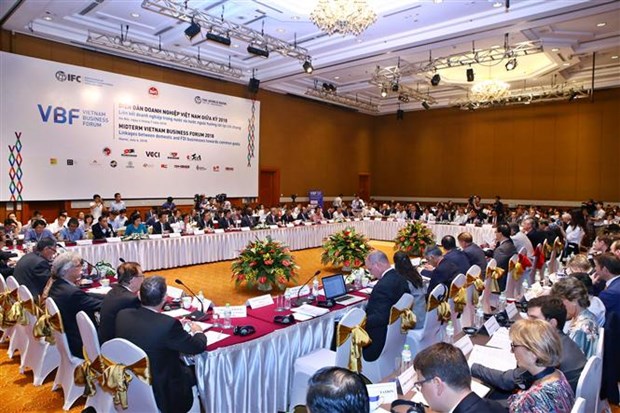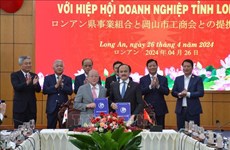Recommendations given to forge stronger FDI-domestic businesses links
Representatives from foreign-invested enterprises and foreign business associations in Vietnam gave their recommendations on fostering linkages between FDI and domestic firms at the mid-term Vietnam Business Forum (VBF) 2018 that opened in Hanoi on July 4.
 Overview of the forum (Photo: VNA)
Overview of the forum (Photo: VNA)Hanoi (VNA) – Representatives from foreign-invested enterprises and foreign business associations in Vietnam gave their recommendations on fostering linkages between FDI and domestic firms at the mid-term Vietnam Business Forum (VBF) 2018 that opened in Hanoi on July 4.
Kim Heung Soo, President of the Republic of Korea Chamber of Commerce (KOCHAM) in Vietnam, said that the majority of Vietnamese enterprises have yet to produce sufficient support products to supply to FDI firms.
Therefore, the Government of Vietnam and FDI enterprises should focus on dealing with the situation, he said, adding that RoK companies are working hard on growing the support industry in Vietnam and assisting small- and medium-sized enterprises.
The RoK-invested Samsung Electronics Vietnam has raised its productivity to 85 percent through consultation programmes for their Vietnamese partners and suppliers, said Kim.
He added that Samsung’s programmes have drawn a total of 26 Vietnamese firms since 2015, which have helped the firm improve its operation efficiency by 30 percent and reduce production defect by over 20 percent.
Meanwhile, Koji Ito, President of the Japan Chamber of Commerce and Industry in Vietnam (JCCI), said that forging stronger connections between FDI enterprises and Vietnamese firms is of significant importance for Vietnam in order to raise its position in the global supply chain.
He held the view that one of the responsibilities of the Government is designing regulations to create optimal conditions for enterprises, asserting that it is necessary to connect Vietnamese companies with FDI firms so as to strengthen their access to human resources, capital, and products.
The representative also raised many concerns by Japanese investors and underscored that if the Government keeps the fiscal policies too tight by limiting public debt at below 65 percent of the GDP, it will become a hindrance to infrastructure and construction. Vietnam is in need of investment in this field to ensure middle- and long-term economic growth, he added, stressing that underdeveloped infrastructure will reduce the attraction of Vietnam to foreign enterprises, while also harming the connectivity between existing Vietnamese and FDI businesses.
JCCI proposed that Vietnam roll out measures to reform the structure of its budget expenditure and collection, while reviewing the efficiency of loans.
Participants also showed their hope for improvements in tax and customs policies.
Representatives of Asian and European businesses also asserted that although Vietnam has exerted great efforts in the work, many shortcomings have been seen in its tax and customs policies, including problems on tax exemption and refund, the transparency of tax reports, and the professionality of tax and customs officials in auditing and inspecting, as wells as many obstacles from post-clearance examination and current tax policies.
Nicolas Audier, President of the European Chamber of Commerce (EUROCHAM) in Vietnam, said that tax policies should be renovated to lure more investors.
He said that Europeans are keen on Vietnam’s energy market and wish for the Vietnamese Government’s assurance of transparency and coherence in both its investment attraction policy as well as intellectual property protection.
Ousmane Dione, World Bank Country Director in Vietnam, recommended that local Vietnamese firms should enhance their capacity and competitiveness to become suppliers to foreign businesses, which means engaging deeper with the global value chain.
This is also a stage to make full use of opportunities from the fourth industrial revolution, stated Dione.-VNA













